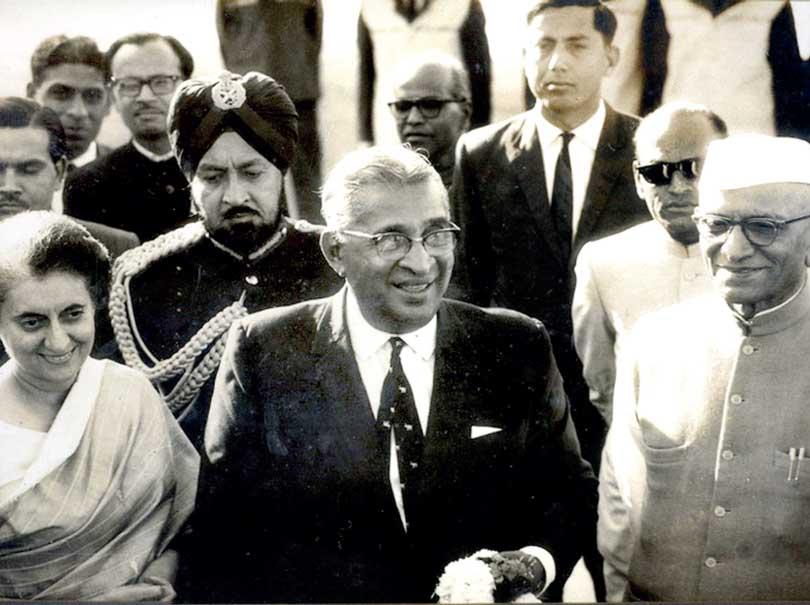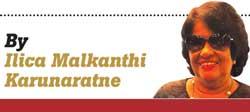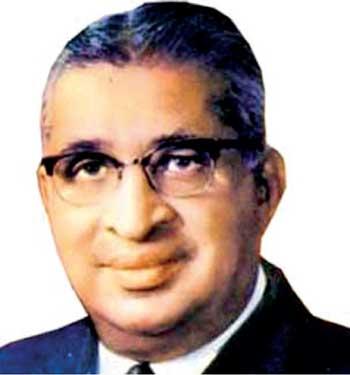Reply To:
Name - Reply Comment

Prime Minister Dudley Senanayake with former Indian Prime Minister Indira Gandhi and other Indian leaders
- He loved all the good things of life; reading, music, photography, loved dogs, good food and had an uproarious laugh.
- His generosity of spirit was somewhat like Shakespeare’s favourite King, Henry V, portrayed vividly in his plays which was sometimes called a soft touch. He had brilliance with a sharp daunting humour which often threw his political peers off balance in Parliament.
- He was a visionary far ahead of his time, believed wholehearted in an agricultural economy and was always totally against the Executive Presidency.
- His untimely death due to a sudden heart attack was due to his extreme sensitivity and anguish, caused by threats of breakaways from his party.
- One of Dudley’s most admirable qualities was his unshakeable loyalty to his party, the UNP through thick and thin.
 The late Dudley Senanayake remains unforgettable to all those who had the privilege of knowing him. We think of him more than ever on June 19 which was his birth anniversary. What was it that made him different from other politicians of his time or thereafter? He was both an internationalist and a liberal in his political thinking. Although there were political giants like the late Dr. N. M. Perera, the late Dr. Colvin .R. de Silva, the late Philip Goonewardene, the late Dr. S.A. Wickeremsinghe and the late Pieter Keuneman who were his peers in Parliament, he strode the political arena of his time like a colossus. His ripostes were superior to all of them and he kept that most august assembly in fits of laughter with his wit, unique sense of humour and warmth.
The late Dudley Senanayake remains unforgettable to all those who had the privilege of knowing him. We think of him more than ever on June 19 which was his birth anniversary. What was it that made him different from other politicians of his time or thereafter? He was both an internationalist and a liberal in his political thinking. Although there were political giants like the late Dr. N. M. Perera, the late Dr. Colvin .R. de Silva, the late Philip Goonewardene, the late Dr. S.A. Wickeremsinghe and the late Pieter Keuneman who were his peers in Parliament, he strode the political arena of his time like a colossus. His ripostes were superior to all of them and he kept that most august assembly in fits of laughter with his wit, unique sense of humour and warmth.
 A Visionary
A Visionary
He was a visionary far ahead of his time, believed wholeheartedly in an agricultural economy and was always totally against the Executive Presidency. We can see for ourselves now how right he was and what harm it did, especially soon after the Presidency of President Jayewardene. He believed in free enterprise and that democracy was the only realistic safeguard against repression. My paternal uncle and he were classmates, my uncle never failed to refer to him as Dudley the Great and wrote countless letters to him, to which Dudley never failed to reply. He was my late husband’s political mentor, he was just outside his room in the hospital when he died, having been there most of the night together with his other close supporters. He was the type of man who made it a point to remember both people and things. Dudley’s charm, charisma and popularity were his greatest weapons against his peers in politics. He loved all the good things of life; reading, music, photography, loved dogs, good food and had an uproarious laugh. He was an extremely simple person and a gentleman to his fingertips, the genuine article as it were. The grandeur, perks and privileges of power never appealed to him.
Sense of humour
I recall two instances of his sense of humour, when I was present to listen to a debate in Parliament. One was to the late Maithripala Senanayake, whose wife was a Tamil. He said ‘Sir, the member for Medawachiya, believes in Sinhala only by day and the reasonable use of Tamil at night.’ Another was when the late Stanley Tillekaratne, who was short in stature, kept shouting ‘what about the split’, referring to some differences between Dudley and the late President Jayewardene, Dudley retorted saying ‘Sir, the Hon member is able to see splits at eye level’. But the good thing about politics in that era was that although politicians attacked each other on politics in Parliament, it was all taken in good spirits and they were all friends, mostly because they were all educated men, on the same intellectual level. I have seen them walk across the floor and shake hands after blistering attacks on each other in Parliament. I regret that this kind of camaraderie is no longer prevalent among most politicians today, I think mostly, because of the lack of education.
Admirable qualities
One of Dudley’s most admirable qualities was his unshakeable loyalty to his party, the UNP through thick and thin. Even when he was thrust out of politics for a while, his heart was always with the party. He returned to lead, when he was invited to do so. I recall a speech made by him in Parliament on the UNP in the 1970’s. ’There is no occasion in the history of the United National Party when in the government or the Opposition, when it has advocated or organised violence. The men who are votaries of bloody revolution, who took advantage of difficult situations in the country to rouse people to violence, who under the guise of trade unionism instigated and encouraged private and public sector employees to sabotage, whose common cry was ‘destroy’ are all in your government. Preening themselves today as advocates of peace. How ill do the feathers of the dove mask the minds and bodies of vultures’?
His untimely death due to a sudden heart attack was due to his extreme sensitivity and anguish, caused by threats of breakaways from his party. His sensitivity was such that he couldn’t take the harassment. What are the qualities that we, his supporters admire most about him? We will never forget his charismatic charm, accessibility, steadfast thinking, incorruptibility and resourcefulness. He was non judgmental, had definite opinions, strength, spirit, intelligence, compassion, and warmth. His generosity of spirit was somewhat like Shakespeare’s favourite King, Henry V, portrayed vividly in his plays which was sometimes called a soft touch. He had brilliance with a sharp daunting humour which often threw his political peers off balance in Parliament. A gentle statesman with the unalterable politics of breeding.
‘Here was a man, when comes such another’.